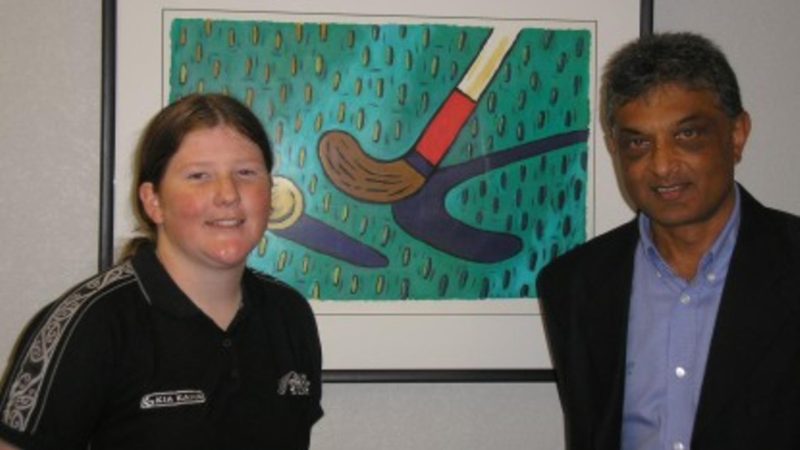
The encouragement by FIH over the past 6 years to recognise Hockey Youth Leaders has resulted in very positive outcomes for both National Federations, as well as the youth leaders themselves. New Zealand has been a hockey nation that has gained a direct benefit from FIH Youth Leadership Initiatives and World Youth Hockey Promoters Festivals.
By Gill Gemming, FIH Continental Development Officer for Oceania
Hockey New Zealand has, for the past five years, had a positive relationship with a number of Auckland Universities and provided a practicum placement opportunity for students who are studying for Sports related degrees ÔÇô coaching, administration or business management. This has been a win-win situation for all concerned as the student gains knowledge of how a national sporting body works and gets a taste of a myriad of daily activities such as data basing, event management and resource development. The National Sports body gains from having enthusiastic individuals contributing with new ideas and often bringing a ÔÇ£fresh youthful approach.ÔÇØ
Nicola Connell is one such Youth Leader who originally came to Hockey New Zealand under this scheme. She was an Auckland representative Goalkeeper, so she already came with a passion for the sport. Nicola's project over the first two years was to help with the Youth Marathon Activities. As she gained confidence, she contributed with ideas of her own, such as the Youth Goalkeepers CD, which was the resource put out this year to support Hockey New Zealand's Youth Week, which coincides with the Global Marathon Weekend. As a result of her contribution Nicola was selected to attend the last World Youth Hockey Promoters Festival in Chile, as the Oceania representative. It was a baptism of fire as Nicola had not travelled before and was not naturally outgoing. However, she took up the challenge, presented well at the Festival and she came back with plenty of ideas that she had gained from other countries representatives, as well as a new personal confidence in her own abilities. That in itself was an excellent outcome from the international forum concept. Nicola's new confidence was recognised by all on her return and led to her receiving an award from her tertiary institute UNITEC at the end of the year.
The Hockey NZ Youth Council invited Nicola to present to them and she gained their support to develop a Youth Hockey Chat Line which has continued to gain momentum. Nicola has also been involved with Auckland Hockey coaching youth Goalkeepers and when the Tongan Women's Team arrived in July, she made herself available to help their goalkeepers and as most of the team are under 23, Nicola helped to establish another Oceania youth network.
Kirsty Yeoman, also doing a practicum, joined Hockey New Zealand this year. Kristy's area of study was nutrition and so she wrote a paper on ÔÇ£Nutrition for Youth TournamentsÔÇØ which was also distributed, as part of Youth Week. Both Kirsty and Nicola became part of the judging panel for the Youth Week competitions, which was an excellent follow up from being part of the Youth Week promotions and creation of the competitions. Kirsty and Nicola attended the weekly staff meetings and were encouraged, by CEO Ramesh Patel, to contribute with their views on issues discussed. In January, during the Blacksticks test series against the Netherlands Men's Team half time ÔÇ£ kids skill sessionsÔÇØ were run and Nicola and Kirsty assisted in planning the sessions out and helping them run smoothly on the days.
Nicola has now completed her degree and with a vacancy opening up in the national office she was offered a position which has been the perfect outcome from the practicum scheme.
The other area that has been of huge benefit to local hockey Associations within New Zealand has been the FIH Youth Leaders' Certificates. This has created a real opportunity to recognise the tremendous contributions by youth in areas of umpiring, coaching, and event management. This year Hockey New Zealand prefaced the nomination process by a paper encouraging Regional Associations to utilise and create opportunities for youth to be involved. It also listed ways that youth members could be of value to the Associations and also the ways in which the Associations could recognise these volunteers and therefore hopefully maintaining their interest over the next years. Secondary schools were also encouraged to nominate youth hockey leaders, as often senior students add value by umpiring or coaching younger teams. As a result, there were more Leadership nominations received in 2007 than ever before. All nominations received a Hockey New Zealand Certificate in recognition of their voluntary contribution and the top 10 were sent through to FIH for recognition at a higher level. Youth hockey leaders add real value at all levels of hockey development in New Zealand and it has been excellent to be able to highlight them in a positive way.























